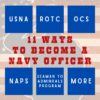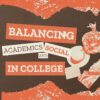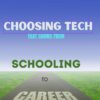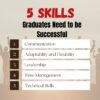Tag: college and career
ASVAB or a Service Academy? You Decide.
If you want to join the military, you can do that by attending a four-year Service Academy or by enlisting. I discussed 11 ways to become a Navy Officer in an earlier article (click for link). Here, I’ll focus on the academics required to be accepted as an enlisted soldier or sailor.
Anyone interested in a non-four-year-degree entry into the military services must take the ASVAB– the Armed Services Vocational Aptitude Battery (ASVAB). It’s multiple choice test administered by United States Military Entrance Processing Command prior to enlistment. Areas of competence include: (more…)
Share this:
11 Ways to Become a Navy Officer and a Gentleman
This is a new Ask a Tech Teacher series on College and Career with a focus on military options. We’ll start with this how-to on becoming an officer and a gentleman:
As the economy gets worse, a career in the military looks better. They are the rare employer who accepts everyone qualified and doesn’t lay you off. Whether you enlist or become an officer is a personal choice. Each requires specific requirements, commitments and responsibilities. Each has its own unique skill set that either fits the prospective candidate or doesn’t. While the pay is greater, so is the stress and demands associated with the work. Me–I have a Navy Officer daughter and an Army enlisted Signal Corps son. Each picked the path that worked best for them.
If you’ve decided that you prefer the officer path to the enlisted, here are your options: (more…)
Share this:
Balancing Academics and Social Life in College
Balancing academics and social life in college is a bigger challenge than it sounds like. As this school year approaches an end and students start to plan on college life, the Ask a Tech Teacher team has suggestions on how to make that work well:
Balancing Academics and Social Life in College
College life is an exhilarating journey filled with learning, discovery, and growth. It’s a unique phase where you’re expected to juggle academics, social activities, part-time jobs, and perhaps even self-care routines. Finding the perfect balance between academics and social life is akin to walking a tightrope. It requires skill, patience, and a bit of a balancing act. So, how does one navigate through this without tipping over? Let’s dive in and explore some strategies to achieve this equilibrium.
Understanding the Importance of Balance
The Academic Foundation
First and foremost, it’s essential to acknowledge that academics are the bedrock of your college experience. They are the main reason you’re in college, after all. Excelling in your studies opens doors to future opportunities, whether it’s graduate school, competitive job markets, or research opportunities. But, why is balance so crucial?
The Social Spectrum
On the flip side, college is more than just grades and textbooks. It’s about building lifelong friendships, networking, developing social skills, and discovering who you are outside of the classroom. These experiences are invaluable and contribute significantly to your personal development and mental well-being. (more…)
Share this:
The Role of Mathematics in Education
The Role of Mathematics in Education: What Professions You Can Get in the Future
Have you ever found yourself pondering the real-world applications of those algebraic formulas or geometric theorems you spent hours trying to decipher in school? Or perhaps, amidst a particularly challenging calculus problem, you’ve questioned how this abstract world of numbers and symbols could possibly influence your future career? Well, you’re not alone. Mathematics, often dubbed the universal language, plays a pivotal role in shaping the educational foundation necessary for a plethora of professions. Let’s dive into the essence of mathematics in education and uncover the vast array of future career opportunities it unlocks. (more…)
Share this:
Choosing Tech That Grows From Your Schooling Into Your Career
Choosing Tech That Grows From Your Schooling Into Your Career
Starting a career is an exhilarating journey, and in today’s tech-driven world, the technology you choose during your school years can be a foundational step toward your professional tech arsenal. Having the right gadgets and tools plays a pivotal role in academic success and setting a strong foundation for your professional life.
The transition from academic life to the professional world is significant, and the technology we use plays a crucial role in this journey. As students, technology aids in learning, research, and collaboration, while in the professional realm, it becomes a tool for productivity, communication, and innovation. The key is to invest in technology that not only meets your current educational needs but also has the potential to adapt and evolve as your career progresses. This approach not only ensures continuity in your tech use but also provides a solid foundation for professional growth. (more…)
Share this:
School and Job Tips for Young Adults
With the school year ending, here are some useful tips from the Ask a Tech Teacher crew for students preparing for college or career:
School and Job Tips for Young Adults
The marketplace for good jobs has always been highly competitive. In the current economic climate, a solid education can serve as the launching pad for a rewarding career. But how can young adults get the training, schooling, and experience to get a job they enjoy? The good news is that there are plenty of effective tactics for diligent students and young professionals who want to make the most out of their education and training.
Besides creating a top-notch resume, modern college-bound people take the time to search for scholarship awards that can offset some or all their school expenses. They also take advantage of summer internships, both paid and unpaid, to acquire up to date workplace skills. While getting ready to take standardized tests in high school or after, prep courses can assist motivated candidates in achieving better scores.
Other no cost learning resources include institution sponsored tutoring programs, online seminars, and self-help guidebooks. For those who find it a challenge to get homework done on time, fixed study hours are a practical solution. Finally, remember to seek guidance when choosing a major field of study. Here are more details about how to navigate a collegiate career and land that first job after graduation.
Share this:
5 Skills Graduates Need to Be Successful
The skills required to succeed in your post-High School life, be it college, a vocational training program, the military, or a job, are surprisingly similar. Commitment to the task at hand by doing your best all the time is a great start, but it isn’t all you need. One of our Ask a Tech Teacher contributors came up with a short list of five skills that will make a big difference in whether you succeed or fail in your post-High School endeavors:
- Communication
- Adaptability and Flexibility
- Leadership
- Time management
- Technical skills
Here’s what you need to know:
5 Skills Graduates Need to Be Successful
The job market is competitive, and having the right skills and the courage to use them can be the difference between success and stagnation. Graduates looking to hit the ground running should be sure to cultivate a good balance of soft and hard skills. Creativity and problem-solving will come in handy in brainstorming solutions and revolution steps for projects, while communication and networking are invaluable when interacting with team members or potential clients. Below are five of the most critical skills that graduates should possess to make their mark on the job market:
Share this:
Choosing the Right Computer Science Specialization
One of the most popular and in-demand skills is anything related to computers–programming, repair, networking, and cybersecurity to name a few. If you love the challenge of coding computers to do just about anything you can visualize, the hardest part of deciding on a post-High School career may be selecting the right specialty. One of our Ask a Tech Teacher crew has come up with a short list of questions you should ask before getting started:
- Is your selected specialty right for you?
- What are the employment opportunities?
- What income can you expect?
Choosing the Right Computer Science Specialization
Specialization is crucial in building a professional career, with most occupations encouraging their current or prospective workforce to gain additional training and knowledge within their domain of expertise. Computer science is no exception. A master’s in computer science program allows you to choose from a wide range of specialty areas based on your specific interests and career goals.
However, with an array of specializations available, knowing the right one to specialize in can be challenging. If you’re looking to enroll in an online MS in CS, it’s important to try and understand what area of specialization will be suitable for your career progression. Below are some of the factors you should consider when choosing a specialization in computer science to ensure you select the right one for you:
Share this:
High School Curricula and Career Education
College enrollment among high school grads grew during the early 2010’s, leveling off about 2017 when it began to drop to a current low of about 62%, approx. 4% lower than 2019. The decline may be due to increased costs, that the cost-benefit of a college degree and earnings after graduation is questionable (according to some studies), the pandemic, or a plethora of other reasons. The current trend among some colleges of not requiring ACT or SAT scores hasn’t stopped the fall.
One of the Ask a Tech Teacher contributors has come up with a good article on how to make career information more easily available to high school graduates, with a focus on those who may not want to continue to a college or University. This article reviews the many benefits of providing career education for high school students and which areas are particularly valuable. It looks at how to best include this learning into an existing curriculum.
How High School teachers can incorporate careers education into the curriculum
Including career education in the curriculum is important for a number of reasons. It will help students to better understand what they want to do when they grow up, and it will also give them a better idea of the different options that are available to them. Teaching high school students about careers also helps them to develop skills that will be useful in their future jobs, such as problem-solving and teamwork. In addition, it can also help to inspire them to pursue their dreams and goals.
Helping students understand their own strengths and weaknesses, and how these match up with different careers
It’s never too early to start thinking about career options. But for many students, the thought of choosing a single path can be daunting. One way to ease the pressure is to help students understand their own strengths and weaknesses, and how these match up with different careers. You can include this in the curriculum by helping students assess their skills and interests, students can then begin to narrow down their options and find a career that is a good fit. In addition, understanding their strengths and weaknesses can help students identify areas that need improvement. With this knowledge in hand, they can then take steps to address any deficiencies and become better prepared for their chosen career. Ultimately, by helping students understand themselves, we can give them the tools they need to make informed decisions about their future.
Share this:
Amazing Benefits of Taking a Short Course
Too often, we think ‘taking a class’ requires a commitment of weeks–or months–to master the topic. Sometimes, you don’t have that much time, they’re too expensive, you aren’t ready to commit to college level courses, or you aren’t sure about investing so much time in a topic you might not enjoy. Thankfully, in today’s learning environment, lots of learning is available via short courses–dedicated classes that are completed quickly. Here’s a great article by the Ask a Tech Teacher crew discussing :
- why take one
- their flexibility
- where to take them
- what to do if you’re ready to get started (especially for those of you who live in Australia)
Amazing Benefits of Taking a Short Course
A short course means learning both academic and physical skills. It gives opportunities to students to learn more about their specific course in a short period. The purpose of short courses is to help students grow their current set of skills. It teaches the basic skills needed for students to become a professional.
Boost Current Skill
Short courses are a great thing to add to each person’s CV, but there is more reason why taking short courses has great benefits. A short course helps students to reach the other set of skills that they need. It also gives little commitment to refresh the things students might need to work on.
AU short courses give professional recognition and a certificate that can add to each person’s CV. It also has many providers that allow students to find courses they need to enhance easily.
Flexibility
People may worry that short courses may take too much of their time,
or maybe it is not worth it. But here is some things that you need to know about the short course:
- All study materials are delivered online
- Students can study anywhere and anytime they want
- Students manage their time studying
A short course is very flexible because it is an online school where every student manages their time of study. It also gives certificates of completion which can add to each person’s portfolio.


















































